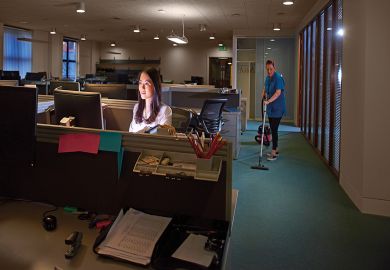An email sent to staff at Teesside University has ignited a debate about flexible working, as a union accused it of imposing “archaic” conditions that restrict academics from working from home or doing off-campus research.
Staff at the School of Health and Life Sciences recently received an email, seen by Times Higher Education, that stated that academics should not work from home for general reasons for more than one or two days per semester and that this should “not be a regular working pattern”.
Requests to work from home should be made five days in advance, it said.
The email also outlined the conditions for “research and scholarly activity” – one potential reason for working off-campus, not subject to a limitation on the number of days per semester – which includes working on books, articles or conference papers. Staff must make requests to do this work by 5pm the day before, and “requests will be rejected if there is no detail”, the email said.
Teesside said reasons for working off-campus for research and scholarly activity could include investigative or creative work and its communication, research conferences, work towards completion of a PhD thesis and preparation of funding bids.
According to University and College Union regional official Iain Owens, there is “widespread discontent among staff” about working conditions and “archaic restrictions being imposed on the ability of staff to work flexibly”.
“Restricting staff to only two days per semester working from home is patronising, impractical and smacks of micromanagerialism,” he said.
According to Mr Owens, staff “have grave concerns that the proposals will impact negatively on teaching quality, research output and staff morale, which is already stretched to breaking point”.
He said that the union was currently engaged in talks with management. “Our members feel that professional respect should be afforded to all staff, and if there is no resolution and the restrictions remain, then we may have no option but to ballot for a formal dispute,” he said.
However, a Teesside University spokesman said there had “been no change to university policy or working arrangements”.
“At the start of the academic year, in response to academic feedback and to build on key strengths, we realigned a number of courses to create a new academic school structure,” he said. This created the School of Health and Life Sciences.
“As part of our commitment to provide the very best student and learning experience, we want our academic staff to have as much contact with students as possible,” he continued. “As such, staff have simply been reminded of the existing university policy, which was agreed with UCU.
“This states that staff wishing to conduct work off-site or to work from home need to agree this in advance with their line manager, as is the case across the university.”
POSTSCRIPT:
Print headline: Your workplace is here, not at home
Register to continue
Why register?
- Registration is free and only takes a moment
- Once registered, you can read 3 articles a month
- Sign up for our newsletter
Subscribe
Or subscribe for unlimited access to:
- Unlimited access to news, views, insights & reviews
- Digital editions
- Digital access to THE’s university and college rankings analysis
Already registered or a current subscriber? Login







